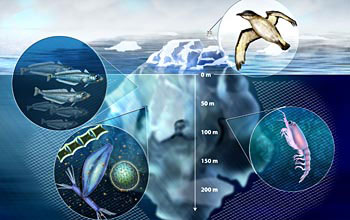Melting Antarctic icebergs help increase biodiversity, slow climate change
Melting Antarctic icebergs help fight climate change
mongabay.com
June 21, 2007
Icebergs breaking off Antarctica are unexpected hotspots of biological productivity and have a surprising role in climate change, reports a new study published in the journal Science.
“Global climate change is causing Antarctic ice shelves to shrink and split apart, yielding thousands of free-drifting icebergs in the nearby Weddell Sea,” states a news release from the University of California at San Diego. “These floating islands of ice — some as large as a dozen miles across — are having a major impact on the ecology of the ocean around them, serving as “hotspots” for ocean life, with thriving communities of seabirds above and a web of phytoplankton, krill, and fish below.”
The researchers found that the release of terrestrial material trapped by icebergs creates a “halo effect” with significantly increased phytoplankton and krill populations out to a two-mile radius around the icebergs. Higher abundance of phytoplankton and krill attracts other forms of sea life and may help offset climate change by absorbing larger amounts of carbon dioxide from the atmosphere.

Icebergs hold trapped terrestrial material, which they release far out at sea as they melt. Credit: Nicolle Rager Fuller, National Science Foundation |
“One important consequence of the increased biological productivity is that free-floating icebergs can serve as a route for carbon dioxide drawdown and sequestration of particulate carbon as it sinks into the deep sea,” said oceanographer Ken Smith of the Monterey Bay Aquarium Research Institute (MBARI), led author of the paper. “While the melting of Antarctic ice shelves is contributing to rising sea levels and other climate change dynamics in complex ways, this additional role of removing carbon from the atmosphere may have implications for global climate models that need to be further studied,”
K.L. Smith, Jr., et al. (2007). “Free-Drifting Icebergs: Hotspots of Chemical and Biological Enrichment in the Weddell Sea,” Science 22 June 2007